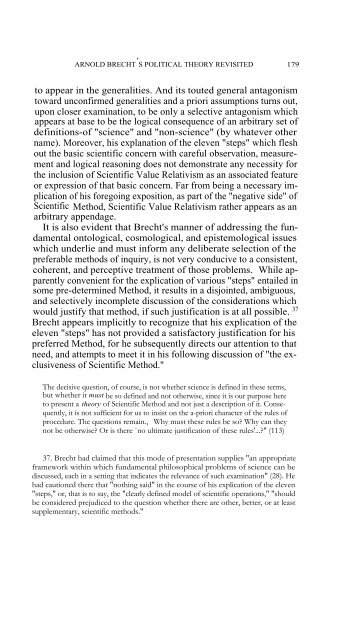ARNOLD BRECHT'S POLITICAL THEORY REVISITED Political ...
ARNOLD BRECHT'S POLITICAL THEORY REVISITED Political ...
ARNOLD BRECHT'S POLITICAL THEORY REVISITED Political ...
You also want an ePaper? Increase the reach of your titles
YUMPU automatically turns print PDFs into web optimized ePapers that Google loves.
<strong>ARNOLD</strong> BRECHT ' S <strong>POLITICAL</strong> <strong>THEORY</strong> <strong>REVISITED</strong> 179<br />
to appear in the generalities. And its touted general antagonism<br />
toward unconfirmed generalities and a priori assumptions turns out,<br />
upon closer examination, to be only a selective antagonism which<br />
appears at base to be the logical consequence of an arbitrary set of<br />
definitions-of "science" and "non-science" (by whatever other<br />
name). Moreover, his explanation of the eleven "steps" which flesh<br />
out the basic scientific concern with careful observation, measurement<br />
and logical reasoning does not demonstrate any necessity for<br />
the inclusion of Scientific Value Relativism as an associated feature<br />
or expression of that basic concern. Far from being a necessary implication<br />
of his foregoing exposition, as part of the "negative side" of<br />
Scientific Method, Scientific Value Relativism rather appears as an<br />
arbitrary appendage.<br />
It is also evident that Brecht's manner of addressing the fundamental<br />
ontological, cosmological, and epistemological issues<br />
which underlie and must inform any deliberate selection of the<br />
preferable methods of inquiry, is not very conducive to a consistent,<br />
coherent, and perceptive treatment of those problems. While apparently<br />
convenient for the explication of various "steps" entailed in<br />
some pre-determined Method, it results in a disjointed, ambiguous,<br />
and selectively incomplete discussion of the considerations which<br />
would justify that method, if such justification is at all possible. 37<br />
Brecht appears implicitly to recognize that his explication of the<br />
eleven "steps" has not provided a satisfactory justification for his<br />
preferred Method, for he subsequently directs our attention to that<br />
need, and attempts to meet it in his following discussion of "the exclusiveness<br />
of Scientific Method."<br />
The decisive question, of course, is not whether science is defined in these terms,<br />
but whether it must be so defined and not otherwise, since it is our purpose here<br />
to present a theory of Scientific Method and not just a description of it. Consequently,<br />
it is not sufficient for us to insist on the a-priori character of the rules of<br />
procedure. The questions remain., Why must these rules be so? Why can they<br />
not be otherwise? Or is there `no ultimate justification of these rules'...?" (113)<br />
37. Brecht had claimed that this mode of presentation supplies "an appropriate<br />
framework within which fundamental philosophical problems of science can be<br />
discussed, each in a setting that indicates the relevance of such examination" (28). He<br />
had cautioned there that "nothing said" in the course of his explication of the eleven<br />
"steps," or, that is to say, the "clearly defined model of scientific operations," "should<br />
be considered prejudiced to the question whether there are other, better, or at least<br />
supplementary, scientific methods."
















